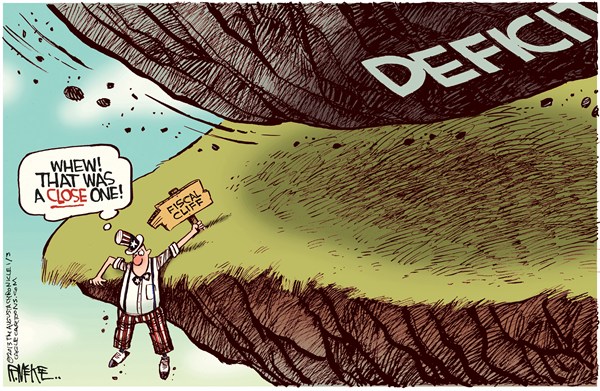Although I’m certain that the holidays were, for many, a chance to clear your minds and unwind (and for those of you at Law Games, I won’t tell your mothers), but it only took a cursory look at the newspapers to be faced with the unavoidable spectre of the so-called “fiscal cliff” south of the border. Like most things pertaining to American politics, it was larded with partisanship, brinksmanship, poor judgment, and general hyperbole (although coming from Toronto, I suppose I shouldn’t talk). What was certain, however, was that this was a) completely self-inflicted and b) likely to cause (yet another) global recession.
As we all know, they somehow managed to avoid imminent disaster (for now), but it did lead me to wonder what material we have in the library that might form the basis of a sound care package to American legislators (or, for that matter, to 100 Queen Street West), despite the fact that fiscal planning and public policy are arguably more likely to fall under the purview of our colleagues at the Bronfman library. However, I think that this is probably the best thing. Regardless, you can find all of our books on fiscal policy right here. A few highlights are as follows.
A recent text is Critical Tax Theory: An Introduction, which deals with the increasingly obvious fact that taxation and tax laws are inherently political. Although it is American, the politicization of taxation is hardly unique to the United States, so there is likely much that is transferable to Canadian readers.
Another interesting paper with a foreign focus is Jinyan Li’s paper on Chinese Development and Tax Policy (which is also available to download here). The paper analyzes the impact that tax law can have on both economic and social development, as well as the relationship between tax policy and rule of law.
Somewhat unconventional, but actually rather interesting, is Taking or Making Wealth?, which is essentially a series of short pieces on different government programs, dating back to the 1960s and 1970s. Some are longer than other, and all are very opinionated, but it does offer an interesting insight on government intervention and Canadian regionalism.


